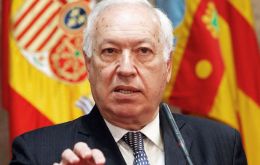MercoPress. South Atlantic News Agency
Politics
-
Wednesday, March 11th 2015 - 05:23 UTC
Bolivia names first woman army General; daughter of the officer who captured Che Guevara

Bolivia has named its first woman army general, the daughter of the military commander who led the final operation against Che Guevara, the state news agency said Monday.
-
Wednesday, March 11th 2015 - 03:02 UTC
Petrobras whistleblower says Rousseff's party received US$ 200 million from Petrobras contracts

A former Petrobras executive told a congressional hearing in Brazil on Tuesday that the ruling political party received up to 200 million dollars skimmed from contracts with the state-run oil company, reiterating claims made in plea bargain testimony.
-
Wednesday, March 11th 2015 - 02:21 UTC
Falklands Historic Dockyard Museum shortlisted in Museums/Heritage Awards for Excellence 2015

The Falkland Islands Museum & National Trust is very proud to announce that the Historic Dockyard Museum has been shortlisted in the International category of the Museums + Heritage Awards for Excellence 2015.
-
Tuesday, March 10th 2015 - 08:34 UTC
Spain insists in blocking Gibraltar from EU single sky measures

Spanish Foreign Minister Jose Manuel Garcia Margallo has renewed his bid to have Gibraltar excluded from the European Union aviation measures. According to Spanish wire reports he raised the issue in Riga during a conference of foreign ministers which was intended to focus on the crisis with Russia and Ukraine.
-
Tuesday, March 10th 2015 - 08:07 UTC
US confirms sanctions against seven top officials from Maduro's regime

United States President Obama on Monday issued a new Executive Order (E.O.) declaring a national emergency with respect to the unusual and extraordinary threat to the national security and foreign policy of the United States posed by the situation in Venezuela.
-
Tuesday, March 10th 2015 - 07:05 UTC
Brazilian lawmakers accused of Petrobras graft fight back

Brazil’s congressional heads denied involvement in the country’s largest graft scandal after being named among dozens of politicians for investigation. Renan Calheiros and Eduardo Cunha, the heads of the Senate and Lower House respectively, and Rio de Janeiro Senator Lindbergh Farias all rejected allegations of graft in the Petrobras kickback scheme dubbed “Carwash.”
-
Tuesday, March 10th 2015 - 06:46 UTC
ECLAC estimates 28% of Latin America's population live in poverty

Poverty affected 28% of Latin America’s population in 2014, revealing that its decline has stalled at around that level since 2012, while indigence rose to 12.0% from 11.3% during the same two-year period in an overall context of economic deceleration, according to the projections from a study released by the Economic Commission for Latin America and the Caribbean (ECLAC) in Santiago, Chile.
-
Tuesday, March 10th 2015 - 06:33 UTC
Journalist who first reported Nisman's death sues Aerolineas and Telam

Following the death of special prosecutor Alberto Nisman, an Argentine-Israeli journalist who first reported the death has sued two state-owned companies that publicized his private data.
-
Tuesday, March 10th 2015 - 06:17 UTC
Saudi Arabia largest importer of defense equipment in 2014, and probably 2015

Saudi Arabia has replaced India as the largest importer of defense equipment worldwide and took the top spot as the number one trading partner for the US in 2014, according to IHS’ annual Global Defense Trade Report.
-
Tuesday, March 10th 2015 - 06:12 UTC
Former French Olympic sports' figures die in helicopter collision in Argentina

Two helicopters have collided in mid-air in northern Argentina, killing 10 people including cast members filming a French reality show, officials said. The crash happened Monday afternoon in a mountainous part of La Rioja, a scenic area popular with tourists, around 1,100 kilometres north of the capital Buenos Aires.
